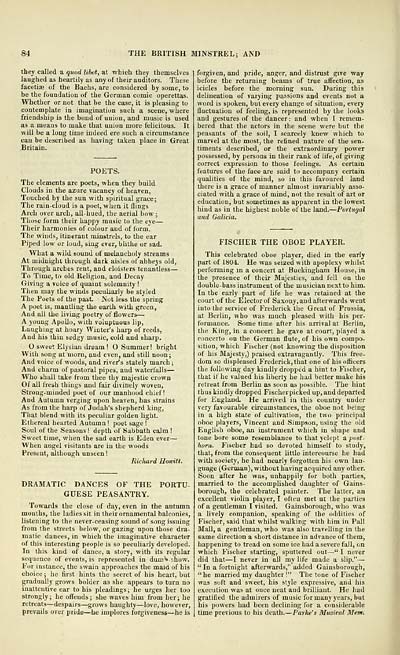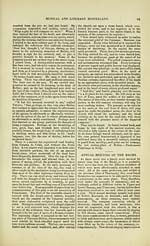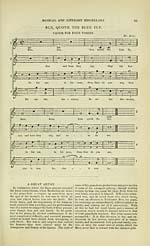Glen Collection of printed music > Printed music > British minstrel, and musical and literary miscellany
(776) Page 84
Download files
Complete book:
Individual page:
Thumbnail gallery: Grid view | List view

84
THE BRITISH MINSTREL; AND
they called a guod libet, at which they themselves
laughed as heartily as any of their auditors. These
facetife of the Baehs, are considered by some, to
be the foundation of the German comic operettas.
Whether or not that be the case, it is pleasing to
contemplate in imagination such a scene, where
friendship is the bond of union, and music is used
as a means to make that union more felicitous. It
will be a long time indeed ere such a circumstance
can be described as having taken place in Great
Britain.
POETS.
The elements are poets, when they build
Clouds in the azure vacancy of heaven,
Touched by the sun with spiritual grace;
The rain-cloud is a poet, when it flings
Arch over arch, allhued, the aerial bow;
Those form their happy music to the eye —
Their harmonies of colour and of form.
The winds, itinerant minstrels, to the ear
Piped low or loud, sing ever, blithe or sad.
What a wild sound of melancholy streams
At midnight through dark aisles of abbeys old.
Through arches rent, and cloisters tenantless —
To Time, to old Keligion, and Decay
Giving a voice of quaint solemnity !
Then may the winds peculiarly be styled
The Poets of the past. Not less the spring
A poet is, mantling the eaith with green,
And all the living poetry of flowers —
A young Apollo, with voluptuous lip,
Laughing at hoary Winter's harp of reeds,
And his thin sedgy music, cold and sharp.
O sweet Elysian dream ! O Summer! bright
With song at morn, and even, and still noon;
And voice of woods, and river's stately march ;
And charm of pastoral pipes, and waterfalls —
Who shall take from thee thy majestic crown
Of all fresh things and fair divinely woven,
Strong-minded poet of our manhood chief!
And Autumn verging upon heaven, has strains
As from the harp of Judah's shepherd king,
That blend with its peculiar golden light
Ethereal hearted Autumn ! poet sage !
Soul of the Seasons ! depth of Sabbath calm !
Sweet time, when the sad earth is Eden ever —
When angel visitants are in the woods
Present, although unseen !
Ricliard Howitt.
DRAMATIC DANCES OF THE PORTU-
GUESE PEASANTRY.
Towards the close of day, even in the autumn
months, the ladies sit in their ornamental balconies,
listening to the never-ceasing sound of song issuing
from the sti'eets below, or gazing upon those dra-
matic dances, in which the imaginative character
of this interesting people is so peculiarly developed.
In this kind of dance, a story, with its regular
sequence of events, is represented in dum'»-show.
For instance, the swain approaches the maid of his
choice ; he first hints the secret of his heart, but
gradually grows bolder as she appears to turn no
inattentive ear to his pleadings; he urges her too
strongly; he offends; she waves him from her; he
retreats — despairs — grows haughty — love, however,
prevails over pride — he implores forgiveness— he is
forgiven, and pride, anger, and distrust give way
before the returning beams of true affection, as
icicles before the morning sun. During this
delineation of varying passions and events not a
word is spoken, but every change of situation, every
fluctuation of feeling, is represented by the looks
and gestures of the dancer : and when I remem-
bered that the actors in the scene were but the
peasants of the soil, I scarcely knew which to
marvel at the most, the reijned nature of the sen-
timents described, or the extraordinary power
possessed, by persons In their rank of life, of giving
correct expression to those feelings. As certain
features of the face are said to accompany certain
qualities of the mind, so in this favoured land
there is a grace of manner almost invariably asso-
ciated with a grace of mind, not the result of art or
education, but sometimes as apparent in the lowest
hind as in the highest noble of the land. — Portugal
and Galicia.
FISCHER THE OBOE PLAYER.
This celebrated oboe player, died in the early
part of 1804. He was seized with apoplexy whilst
performing in a concert at Buckingjjam House, in
the presence of their Majesties, and fell on the
double-bass instrument of the musician next to him.
In the early part of life he was retained at the
court of the Elector of Saxony, and afterwards went
into the service of Frederick the Great of Prussia,
at Berlin, who was much pleased with his per-
formance. Some time after his arrival at Berlin,
the King, in a concert he gave at court, played a
concerto on the German flute, of his own compo-
sition, which Fischer (not knowing the disposition
of his Majesty,) praised extravagantly. This free-
dom so displeased Frederick, that one of his officers
the following day kindly dropped a hint to Fischer,
that if he valued his liberty he had better make his
retreat from Berlin as soon as possible. The hint
thus kindly dropped Fischer picked up, and departed
for England. He arrived in this country under
very favourable circumstances, the oboe not being
in a high state of cultivation, the two principal
oboe players, Vincent and Simpson, using the old
Enghsh oboe, an instrument which in shape and
tone bore some resemblance to that yclept a post-
horn. Fischer had so devoted himself to study,
that, from the consequent little intercourse he had
with society, he had nearly forgotten his own lan-
guage (German), without having acquired any other.
Soon after he was, unhappily for both parties,
married to the accomplished daughter of Gains-
borough, the celebrated painter. The latter, an
excellent violin player, I often met at the parties
of a gentleman I visited. Gainsborough, who was
a lively companion, speaking of the oddities of
Fischer, said that whilst walking with him in Pall
Mall, a gentleman, who was also travelling in the
same direction a short distance in advance of them,
happening to tread on some ice had a severe fall, on
which Fischer starting, sputtered out — " I never
did that — I never in all my life made a slip." —
" In a fortnight afterwards," added Gainsborough,
"he married my daughter !" The tone of Fischer
was soft and sweet, his style expressive, and his
execution was at once neat and brilliant. He had
gratified the admirers of music for many years, but
his powers had been declining for a considerable
time previous to his death. — Parke's Mmical Mem.
THE BRITISH MINSTREL; AND
they called a guod libet, at which they themselves
laughed as heartily as any of their auditors. These
facetife of the Baehs, are considered by some, to
be the foundation of the German comic operettas.
Whether or not that be the case, it is pleasing to
contemplate in imagination such a scene, where
friendship is the bond of union, and music is used
as a means to make that union more felicitous. It
will be a long time indeed ere such a circumstance
can be described as having taken place in Great
Britain.
POETS.
The elements are poets, when they build
Clouds in the azure vacancy of heaven,
Touched by the sun with spiritual grace;
The rain-cloud is a poet, when it flings
Arch over arch, allhued, the aerial bow;
Those form their happy music to the eye —
Their harmonies of colour and of form.
The winds, itinerant minstrels, to the ear
Piped low or loud, sing ever, blithe or sad.
What a wild sound of melancholy streams
At midnight through dark aisles of abbeys old.
Through arches rent, and cloisters tenantless —
To Time, to old Keligion, and Decay
Giving a voice of quaint solemnity !
Then may the winds peculiarly be styled
The Poets of the past. Not less the spring
A poet is, mantling the eaith with green,
And all the living poetry of flowers —
A young Apollo, with voluptuous lip,
Laughing at hoary Winter's harp of reeds,
And his thin sedgy music, cold and sharp.
O sweet Elysian dream ! O Summer! bright
With song at morn, and even, and still noon;
And voice of woods, and river's stately march ;
And charm of pastoral pipes, and waterfalls —
Who shall take from thee thy majestic crown
Of all fresh things and fair divinely woven,
Strong-minded poet of our manhood chief!
And Autumn verging upon heaven, has strains
As from the harp of Judah's shepherd king,
That blend with its peculiar golden light
Ethereal hearted Autumn ! poet sage !
Soul of the Seasons ! depth of Sabbath calm !
Sweet time, when the sad earth is Eden ever —
When angel visitants are in the woods
Present, although unseen !
Ricliard Howitt.
DRAMATIC DANCES OF THE PORTU-
GUESE PEASANTRY.
Towards the close of day, even in the autumn
months, the ladies sit in their ornamental balconies,
listening to the never-ceasing sound of song issuing
from the sti'eets below, or gazing upon those dra-
matic dances, in which the imaginative character
of this interesting people is so peculiarly developed.
In this kind of dance, a story, with its regular
sequence of events, is represented in dum'»-show.
For instance, the swain approaches the maid of his
choice ; he first hints the secret of his heart, but
gradually grows bolder as she appears to turn no
inattentive ear to his pleadings; he urges her too
strongly; he offends; she waves him from her; he
retreats — despairs — grows haughty — love, however,
prevails over pride — he implores forgiveness— he is
forgiven, and pride, anger, and distrust give way
before the returning beams of true affection, as
icicles before the morning sun. During this
delineation of varying passions and events not a
word is spoken, but every change of situation, every
fluctuation of feeling, is represented by the looks
and gestures of the dancer : and when I remem-
bered that the actors in the scene were but the
peasants of the soil, I scarcely knew which to
marvel at the most, the reijned nature of the sen-
timents described, or the extraordinary power
possessed, by persons In their rank of life, of giving
correct expression to those feelings. As certain
features of the face are said to accompany certain
qualities of the mind, so in this favoured land
there is a grace of manner almost invariably asso-
ciated with a grace of mind, not the result of art or
education, but sometimes as apparent in the lowest
hind as in the highest noble of the land. — Portugal
and Galicia.
FISCHER THE OBOE PLAYER.
This celebrated oboe player, died in the early
part of 1804. He was seized with apoplexy whilst
performing in a concert at Buckingjjam House, in
the presence of their Majesties, and fell on the
double-bass instrument of the musician next to him.
In the early part of life he was retained at the
court of the Elector of Saxony, and afterwards went
into the service of Frederick the Great of Prussia,
at Berlin, who was much pleased with his per-
formance. Some time after his arrival at Berlin,
the King, in a concert he gave at court, played a
concerto on the German flute, of his own compo-
sition, which Fischer (not knowing the disposition
of his Majesty,) praised extravagantly. This free-
dom so displeased Frederick, that one of his officers
the following day kindly dropped a hint to Fischer,
that if he valued his liberty he had better make his
retreat from Berlin as soon as possible. The hint
thus kindly dropped Fischer picked up, and departed
for England. He arrived in this country under
very favourable circumstances, the oboe not being
in a high state of cultivation, the two principal
oboe players, Vincent and Simpson, using the old
Enghsh oboe, an instrument which in shape and
tone bore some resemblance to that yclept a post-
horn. Fischer had so devoted himself to study,
that, from the consequent little intercourse he had
with society, he had nearly forgotten his own lan-
guage (German), without having acquired any other.
Soon after he was, unhappily for both parties,
married to the accomplished daughter of Gains-
borough, the celebrated painter. The latter, an
excellent violin player, I often met at the parties
of a gentleman I visited. Gainsborough, who was
a lively companion, speaking of the oddities of
Fischer, said that whilst walking with him in Pall
Mall, a gentleman, who was also travelling in the
same direction a short distance in advance of them,
happening to tread on some ice had a severe fall, on
which Fischer starting, sputtered out — " I never
did that — I never in all my life made a slip." —
" In a fortnight afterwards," added Gainsborough,
"he married my daughter !" The tone of Fischer
was soft and sweet, his style expressive, and his
execution was at once neat and brilliant. He had
gratified the admirers of music for many years, but
his powers had been declining for a considerable
time previous to his death. — Parke's Mmical Mem.
Set display mode to: Large image | Transcription
Images and transcriptions on this page, including medium image downloads, may be used under the Creative Commons Attribution 4.0 International Licence unless otherwise stated. ![]()
| Special collections of printed music > Glen Collection of printed music > Printed music > British minstrel, and musical and literary miscellany > (776) Page 84 |
|---|
| Permanent URL | https://digital.nls.uk/91444257 |
|---|
| Description | Scottish songs and music of the 18th and early 19th centuries, including music for the Highland bagpipe. These are selected items from the collection of John Glen (1833 to 1904). Also includes a few manuscripts, some treatises, and other books on the subject. |
|---|
| Description | The Glen Collection and the Inglis Collection represent mainly 18th and 19th century Scottish music, including Scottish songs. The collections of Berlioz and Verdi collected by bibliographer Cecil Hopkinson contain contemporary and later editions of the works of the two composers Berlioz and Verdi. |
|---|

